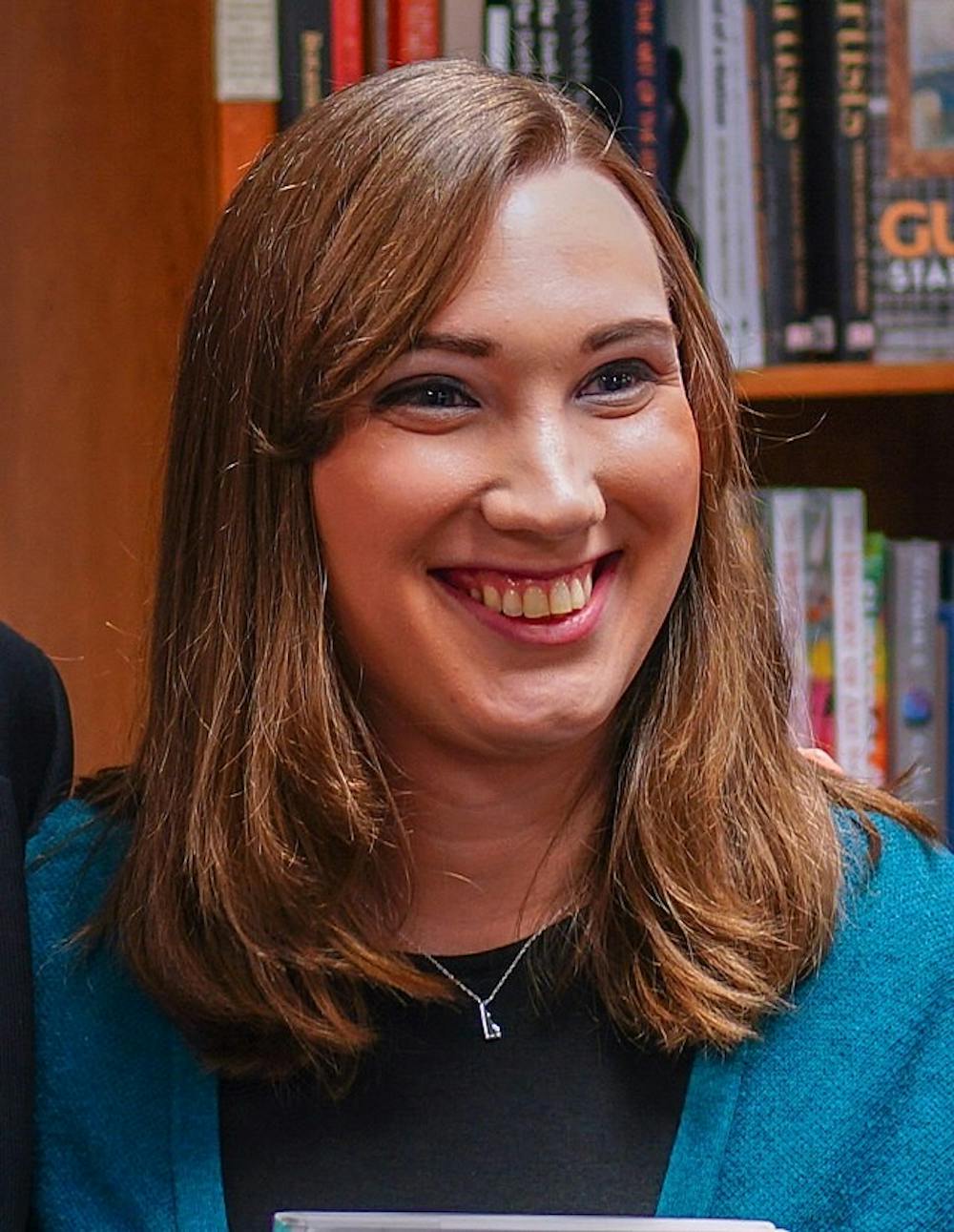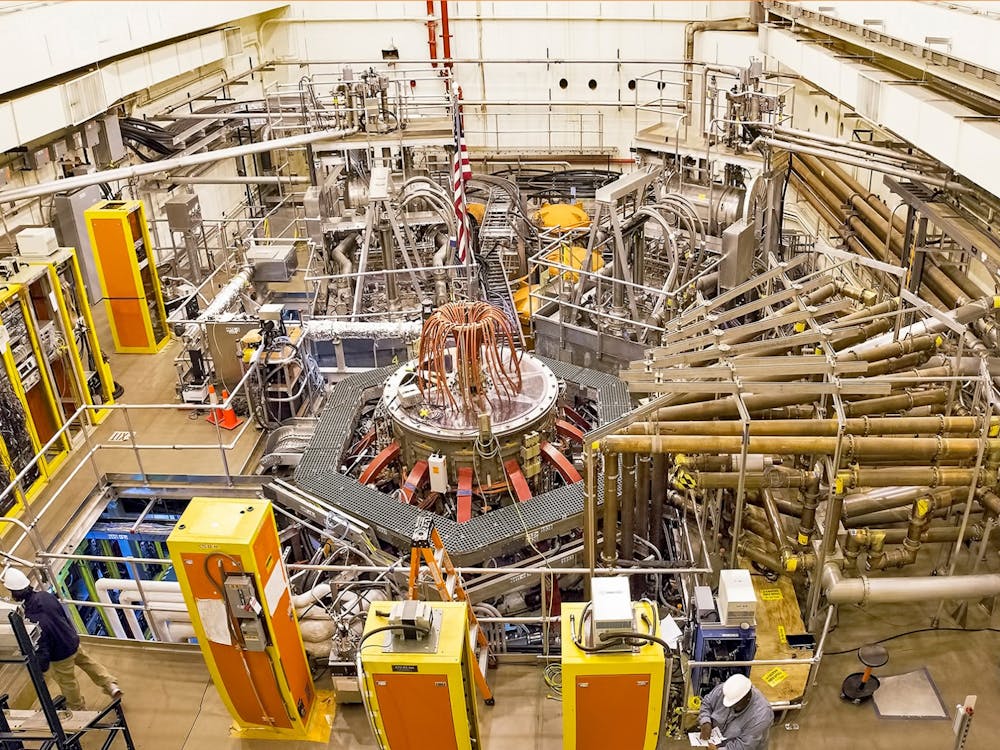On Wednesday, Nov. 17, Delaware State Senator Sarah McBride addressed members of the Princeton University community in a digital event for the School of Public and International Affairs. While serving as American University’s (AU) student body president in 2012, McBride gained international attention for coming out as transgender in her school newspaper. In November 2020, she became the highest-ranking transgender elected official in U.S. history when she won the state senate election for Delaware’s First district.
McBride sat down with The Daily Princetonian to discuss her political trajectory, advice to Princeton’s student activists, and daily responsibilities as a state senator.
Note: The following transcript has been lightly edited for clarity and concision.
The Daily Princetonian: When you were a teenager, you kickstarted your political career by working on Jack Markell’s campaign for Delaware governor. What was one of the more surprising things you learned from that experience?
Sarah McBride: Working in politics as a young person, I was surprised at how much my voice mattered, how — particularly in a small state — one young person could make a real difference. I think partly because there weren't a ton of young people volunteering on state treasurer and governor campaigns, the fact that I was young and involved meant that people listened to what I had to say.
DP: College is often a formative time for shaping people’s politics. If you can, tell me about a class you took or a professor you encountered at American University who substantially informed your political beliefs.
SM: One whom I remember is Professor Kimberly Cowell-Meyers, who taught my freshman year comparative politics class. When you are studying different governments around the world, and even the diversity of structure here in the United States, you see very clearly how structural differences can affect not just policy outcomes, but also the overall health of our government.
More personally, I was part of a program in the School of Public Affairs at American University that was led by a professor named Margaret Marr. I remember sitting in her office after I came out, talking with her about how I had stayed inside of myself for 21 years because I thought that the idea of being out and pursuing any professional fulfillment were mutually exclusive.

“You know,” she said to me, “there are experiences in my life where I thought the exact same thing. And as I've seen society change, one of the things that I regret is that I bought into that belief and I didn't pursue that path.” It was exactly the right thing that I needed to hear at that moment. It was one of those formative conversations early on in my own journey to coming out, when I realized that the only limitation on our capacity to do something, the only full limitation, is the limitation of our own imagination.
DP: In your memoir “Tomorrow Will be Different,” you wrote that students at American University “were often more interested in interning on Capitol Hill than in improving their own campus,” a problem that’s common to many universities. In your view, why is campus politics important, and how can student leaders get their peers to care about it?
SM: Whether we're talking about campuses, local government, or state government, I think what connects all of them is that they can be laboratories for bold ideas. They can be the proving ground for the policies that we seek to implement, where we can take chances on a new idea that might be more challenging to adopt nationwide simply because it's new.
If you look at any meaningful change in our country, the first place that it happens is not Washington, D.C. The first place it happens is oftentimes on college campuses. Then from there, cities and state governments adopt those policies, and then eventually, the federal government feels empowered by the success of those local and state programs to implement the policy at the federal level. If we can't change our campus, then how can we expect to change our country?

DP: As student body president, you pushed for American University to create gender neutral housing and an LGBT Studies program. What was the most difficult part of working with the administration, and to what do you attribute your success?
SM: One of the more challenging dynamics for campus advocacy is that the administration knows that it can wait out the student. They know that if they wait long enough, the student won't even be on campus. Often, too, a student only reaches their maximum leverage to effectuate change by the time that they're a junior or senior, so it’s probably only one to two years that the person is still going to be on campus. The incentive for the University to just delay — and in delaying, ultimately entirely deferring — was a challenge that I constantly had to push back [against].
You need to instill that sense of urgency, but also you need to recognize that you aren’t going to win everything in your one year. All we can do is write our own chapter in a story; none of us are going to write the complete book. And that doesn't mean we don't demand change as quickly as possible, that we don’t fight for all that we need to fight for. But we can do the best job we can in the time that we have it and deliver as much change as possible in that time.
DP: Here at Princeton, undergraduates are pushing for the University to divest its endowment from fossil fuels. What would your advice be for the student activists, given your experience advocating for divestment at American?
SM: That's one of the issues that comes to mind when I talk about the long game. During my time, we pushed for the creation of a socially responsible investing committee on our board of trustees, and we didn't even achieve that in my year. But the next year, they succeeded after the president who followed me continued that fight.
This issue reminds me that a lot of times when we're talking about change, we don't think about succession planning. While we need urgent, immediate, bold change, we also have to plan for what happens if we don't get everything that we need right now. For us, it was a gradual process where we were able to first get that committee created, and then we used that committee to leverage student voices and get the information we needed to make the fuller case to the board.
DP: You're hosting a round table conversation tomorrow called “Paid Leave Works,” where you will discuss your pending bill to implement paid family and medical leave in Delaware. What do you think is the best argument against your bill, and why do you disagree with it?
SM: People have certainly raised concerns about whether small businesses can adapt to an employee being out. But in the end, businesses end up saving money from these programs, which is why in states like California that have implemented paid family medical leave, 90 percent of businesses say that it has either no impact on their bottom line or a positive impact on their bottom line. In fact, small businesses are even more likely than large businesses to say that it has that positive impact. Not only can businesses adapt to paid leave, but these programs are necessary for them to compete for talent, to retain talent, to lower costs, and to treat their employees with the dignity that they deserve.
DP: One thing I'm curious about in the life of politicians — and state senators, particularly — is that you have to consider a vast breadth of issues in a given term, ranging from health care privacy to infrastructure to housing. You've spent a long-term time focusing on paid family and medical leave and amassing expertise. But could you tell me about a time recently where you learned about an issue from scratch? Where did you turn?
SM: Intellectual humility is one of the most important traits in an elected official — the understanding that none of us know everything about everything, and that it's okay to say, “I don't know the answer.”
There are a ton of examples. One is that I've had to get up to speed very quickly on all forms of health policy here in Delaware, particularly vaccination policy and the strategies for large-scale mass vaccination. As the chair of the Senate Health Committee, I was really active with the administration in conveying feedback and concerns and asking questions on behalf of my colleagues in the majority caucus in the Senate. Another new issue was the legal dynamics for manufactured homes.
But there's not a single subject where there's not more that I need to learn, where there's not more that all of us need to learn. We've got some great staff in the majority caucus that help us, from my legislative aide to our policy team. Then there are advocates who work on these issues every single day, some who are paid, some who are volunteers, that provide a lens. But what's really important when you're engaging with professional lobbyists is to understand that they're coming from a particular perspective, right? It’s a perspective that should be heard, just as every perspective should be heard. But what they're saying is certainly not gospel.
DP: What is an unsexy but important political issue that people should be paying more attention to?
SM: I think it's increased in sexiness, but I will say that the massive market shifts that we are about to see towards electric vehicles present some of the most existential questions that we've faced since the advent of the Internet. The market is moving in a very new direction, and that raises questions about accessibility. How do we make these practical options? How do we plan for the future with the expectation that technology is going to evolve, but also not rest on technology inevitably evolving in the way that we hope and expect it will? How do we continue to fund our infrastructure when so much of the money comes from the use of gas and combustion-powered vehicles? These are really big questions. I don't think we have fully wrapped our minds around the inevitable and imminent shift that is about to occur, that will fundamentally upend everything from finances to our daily quality of life.








